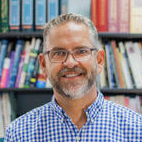As an undergraduate student, I was an editorial writer for the Dordt College newspaper. Together with a young band of know-it-all comrades, we took on the institution – the president, the board, the faculty – anyone in our line of sight who didn’t “get it” like we did. It was a revolutionary time. The Berlin Wall was coming down. Students were protesting in Tiananmen Square. Mandela was released from jail. We were living in the moment – participating! We felt powerful. And righteous in our causes.
Back then, we’d sit around in my dorm and talk about the issues. I’d go into the basement office of the college newspaper, turn on The Cure and produce my content for our next radical issue. The next morning, the editor and a faculty adviser would read the content, edit away and send the paper off to print. By the time I’d see the finished product, I’d be well on my way to imagining my next piece. The process slowed me down. It didn’t keep me from saying some stupid things, but it helped a bit. I had community.
We felt powerful. And righteous in our causes.
Today, our reactions to the news cycle are instantaneous and public. There is something wonderful about this. Gil Scott-Heron’s poetic phrase “the revolution will not be televised” has come to fruition. The revolution is live. Every voice can weigh in. We’re not waiting on Walter Cronkite’s opinion. Previously voiceless masses now can be heard. Sixteen-year-old Farah Baker can live-tweet Israeli attacks on Gaza in a way that awakens the world to the Palestinian plight. This is beautiful.
But this new reality is not without challenges. I was a pastor for many years, and now I teach pastors. As an early adopter of social media, I believe in its power, but I’m also reflecting on how Christian leaders use it to engage with others. I had community back in the day to filter my stupidity. Thank God. I might not have survived to be a pastor today if some of my urgent thoughts had been immediately broadcast!
I began writing during a historic moment, a moment when student voices were growing in power. Today we’re living in another significant historical moment. And students – prophets that they often are – are speaking again. I love to hear my students speak. I love their passion, their utter incapacity to be numb or silent on the urgent issues we face – systemic racism, police violence, gun control. I also love it when they jump back on later and say, “I should have said that a bit differently.”
I don’t want them to be stupid like I was. I said to one student, “Just talk this out with a therapist first, then tweet!” I want my students and my children to be wise – never silent, but wise. I don’t know how to do this well and wisely and without being self-righteous myself. But I’m wrestling with it. And so are they.
Pray for all of us.
Chuck DeGroat teaches pastoral care and counseling at Western Theological Seminary.
Photo: Death to the Stock Photo

